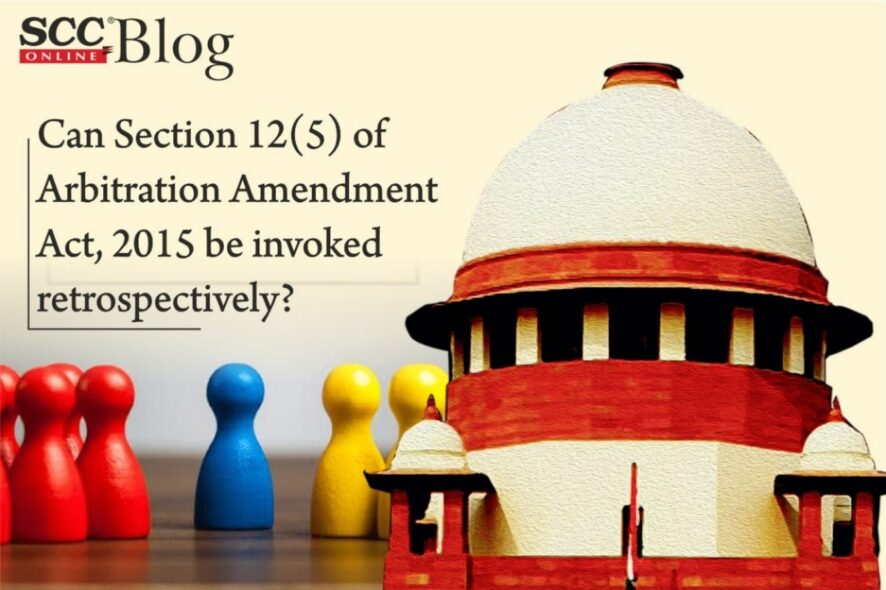Supreme Court: Applying the rule against bias and neutrality of the Arbitrator, the Division Bench of M.R. Shah* and B.V. Nagarathna, jj., reiterated that when the arbitration clause is found to be foul with Section 12 (5), the appointment of the arbitrator would be beyond the pale of the arbitration agreement.
Feeling aggrieved and dissatisfied with the impugned judgment and order of the Madhya Pradesh High Court by which the application preferred by the appellant under Section 14 read with Sections 11 and 15 of the Arbitration and Conciliation Act, 1996 seeking termination of the mandate of originally constituted Arbitral Tribunal and to appoint a new arbitrator had been dismissed, the appellant-applicant had preferred the present appeal.
The facts of the case where that the appellant was awarded a tender for supply of the cream wove paper and duplicating paper for the year 1993-94 by the State, however a dispute arose between the parties. According to the appellant, though it supplied 420 MT of cream wove paper and 238 MT of duplicating paper to the respondent, the latter not only did not make the payment of 90% of the amount as per the terms of the contract, but also rejected some consignments without any justification, causing loss to it.
It was in the above backdrop that an Arbitral Tribunal was constituted as “Stationery Purchase Committee” comprising the officers of the respondent. The appellant assailed the constitution of the Arbitral Tribunal before the High Court at first under section 13 of the Act in the year 2000 and later on under sections 11 and 15 of the Act seeking termination of the mandate of originally constituted Arbitral Tribunal which were dismissed by the arbitrator. Before the High Court, the appellant herein heavily relied upon Section 12(5) of the Act.
Reliance was also placed by the appellant on TRF Ltd. v. Energo Engineering Projects Ltd., (2017) 8 SCC 377, to assert that all the five officers constituting the Stationery Purchase Committee, being the employees of the respondent had rendered themselves ineligible to continue as arbitrators. Further, since original members of the Arbitral Tribunal, who initiated the proceedings had retired, a new Arbitral Tribunal had to be constituted and therefore an impartial and independent arbitrator was required to be appointed in terms of Section 11 of the Arbitration Act, 1996.
Submissions of the appellant were rejected by the High Court holding that Section 12(5) was inserted by the Amendment Act, 2015 which shall be made effective w.e.f. 23-10-2015, therefore it could not retrospective operation in the arbitration proceedings already commenced unless the parties otherwise agree.
The Bench observed that though the Arbitral Tribunal (Stationery Purchase Committee) was constituted as per the agreement entered into between the parties in the year 2001, the Tribunal could not commence the arbitration proceedings in view of number of proceedings initiated by the appellant and therefore technically it could not be said that the arbitration proceedings by the Arbitral Tribunal had commenced. Similarly, observing that the main purpose for amending the provision, namely, to provide for “neutrality of arbitrators” and rule against bias, sub-section (5) of Section 12 (as inserted by 2015 Amendment) provided that notwithstanding any prior agreement to the contrary, any person whose relationship with the parties or counsel or the subject matter of the dispute falls under any of the categories specified in the Seventh Schedule, he shall be ineligible to be appointed as an arbitrator.
In such an eventuality, i.e., when the arbitration clause is found to be foul with the amended provision, the appointment of the arbitrator would be beyond the pale of the arbitration agreement, empowering the Court to appoint such an arbitrator as may be permissible. As observed, the Arbitral Tribunal–Stationery Purchase Committee consisted of officers of the respondent-State, therefore, as per Amendment Act, 2015, Section 12 (5) they had become ineligible to act as arbitrators.
Hence, the Bench concluded that the impugned judgment and order was contrary to the law laid down in the cases of TRF Ltd., Bharat Broadband Network Ltd. v. United Telecoms Ltd., (2019) 5 SCC 755, and the recent decision of this Court in the case of Jaipur Zila Dugdh Utpadak Sahkari Sangh Ltd. v. Ajay Sales & Suppliers, 2021 SCC OnLine SC 730, and the same was quashed and set aside. It was held that the earlier Arbitral Tribunal had lost its mandate by operation of law in view of Section 12(5) and a fresh arbitrator had to be appointed to resolve the dispute between the parties.
Consequently, the Bench appointed Justice Abhay Manohar Sapre, a former Supreme Court Judge to act as an arbitrator.
[Ellora Paper Mills Ltd. v. State of Madhya Pradesh, 2022 SCC OnLine SC 8, decided on 04-01-2022]
*Judgment by: Justice M.R. Shah
Appearance by:
For the Appellant: Sandeep Bajaj, Advocate
For the State: Nachiketa Joshi, Advocate
Kamini Sharma, Editorial Assistant has put this report together






